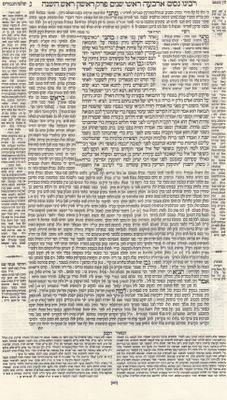
HIDE/SHOW IMAGE
3a
{Rosh HaShana 12b continues}
after the language of people.
{Rosh HaShana 16a}
Mishna:
At four periods in each year the world is judged:
On Pesach for {the growth of} grain.
On Shavuot on the fruits of trees.
On Rosh HaShana all those who come to the world {i.e. humans} pass before Him like residents of Meron {and Bet Meron had a narrow path to get to it}, as it is written {Tehillim 33:15}:
And on Succot they are judged on water.
Gemara:
It was taught {in a brayta}: Grain to which an accident or misfortune befell before Pesach was judged from before. After Pesach was judges for the future. A man to whom an accident of misfortune befell before Yom Kippur was judged from before {from the previous Yom Kippur}. After Yom Kippur it was judged for the future {during Yom Kippur}.
Rava said: We derive from this that two judgements are judged. {before the reaping and before the sowing. For we had previously asked whether this applied to grain standing to be reaped, and brought the above brayta in question on this. See gemara inside.}
They taught in the academy of Rabbi Yishmael:
At four periods in each year the world is judged:
On Pesach on grain.
On Shavuot on the fruit of the tree.
And on Succot on water.
And man is judged on Rosh haShana and the decree on a man is signed on Yom Kippur.
They learnt {in a brayta}: Rabbi Yehuda cites Rabbi Akiva: Why did the Torah say to bring the Omer {offering} on Pesach? Because Pesach is the time of {judgement of?} grain, Hashem said, "offer before Me an omer on Pesach so that the grain in the fields will be blessed." And why does the Torah say to bring the shtei haLechem {two loaves of bread} on Shavuot? For Shavuot is the time of the fruits of the tree, Hashem said, "offer before Me the shtei haLechem on Shavuot so that the fruits of the tree shall be blessed." And why does the Torah say to pour water libations during Succot? Because Succot is the time of the rain of the year, Hashem said, "pour water before Me on Succot so that the rains of the year should be blessed." "And you should say before me on Rosh haShana malchuyot, zichronot and shofarot. Malchuyot, so that you should make Me king upon yourselves. Zichronot, so that your remembrance should be before Me for good.
And what with the shofar?
Rabbi Avahu said: Why do they blow the shofar of a ram? So that I should remember to their credit the Binding of Yitzchak son of Avraham, and consider it as if they had bound themselves before Me.
Rabbi Yitzchak said: Why do they blow tekia and terua blasts on Rosh haShana when they are sitting and blow tekia and terua blasts when thye are standing?
{Rosh haShana 16b}
In order to confuse the Satan.



No comments:
Post a Comment